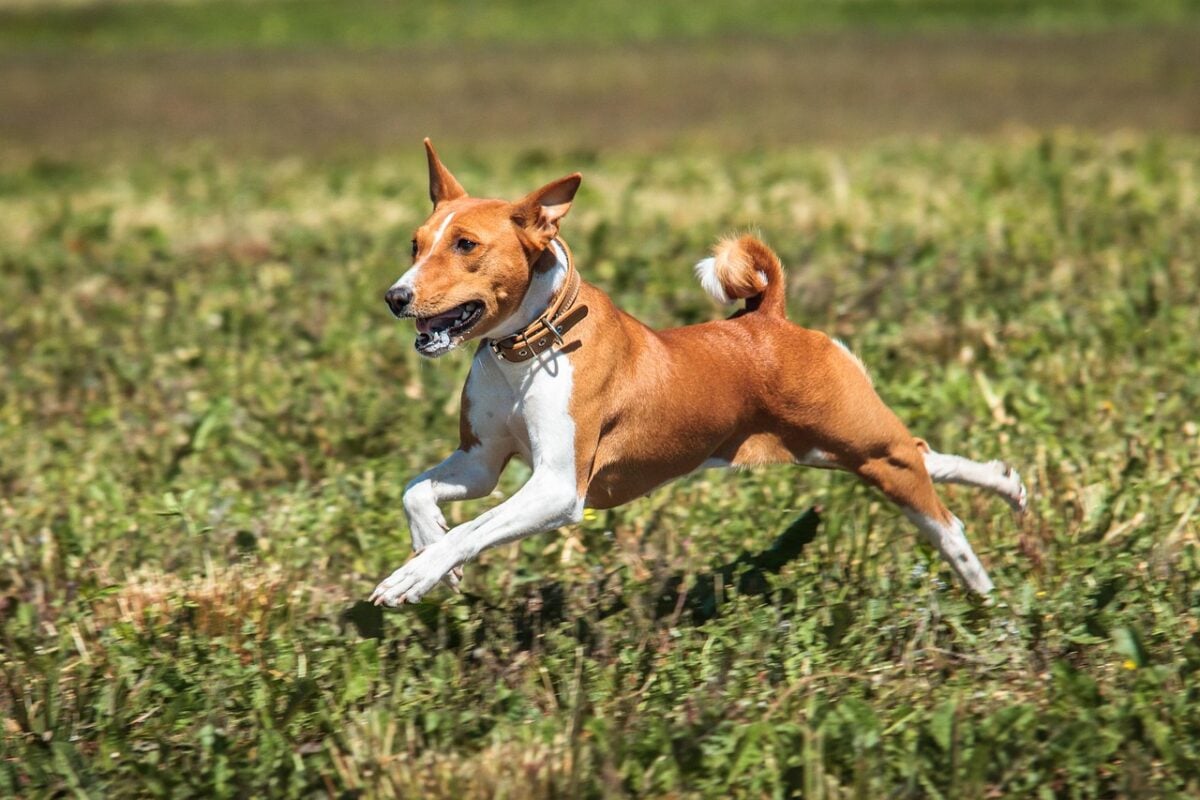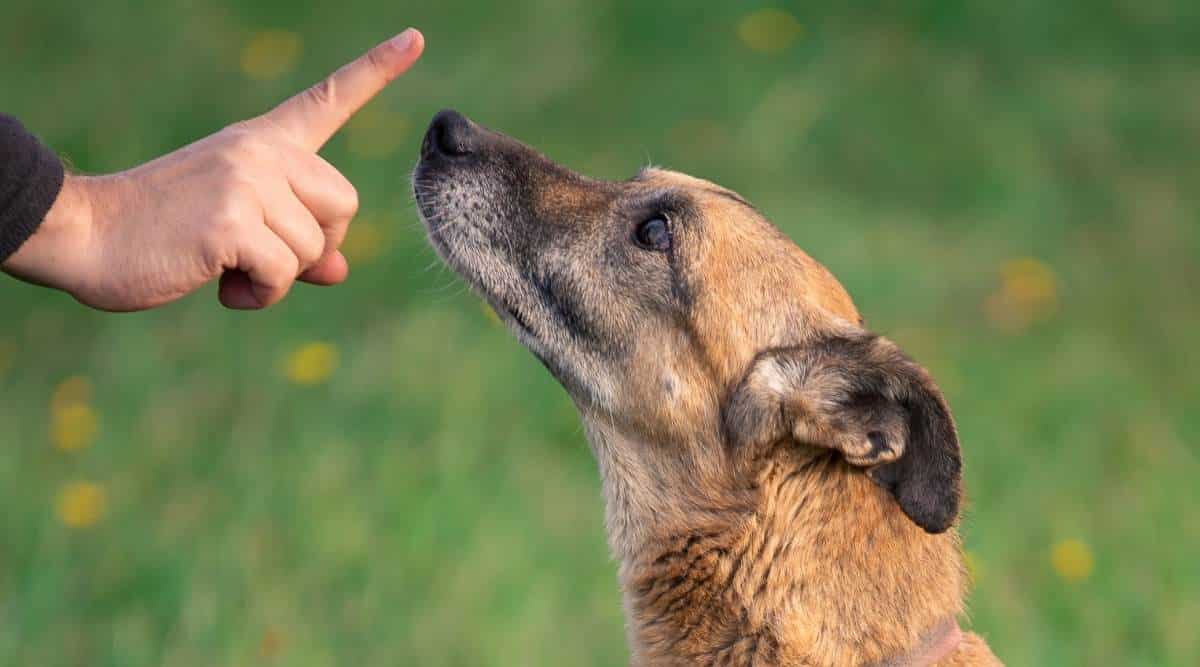What Dogs Bark The Least? 24 Surprisingly Quiet Breeds
When you purchase through links on our site, we may earn a commission. Here’s how it works.
Some dogs bark at the mailman. Others bark at leaves, the wind, or their own reflection. And then there are dogs who don’t. If you’re searching for dog breeds that don’t bark a lot (because you like your sanity, your neighbors, and your Zoom calls uninterrupted), you’re in the right place.
Table of Contents
Quiet dog breeds come in all shapes and sizes. From pint-sized lap warmers to gentle giants, these are the pups who prove you don’t need a non-stop soundtrack to have a loving companion.
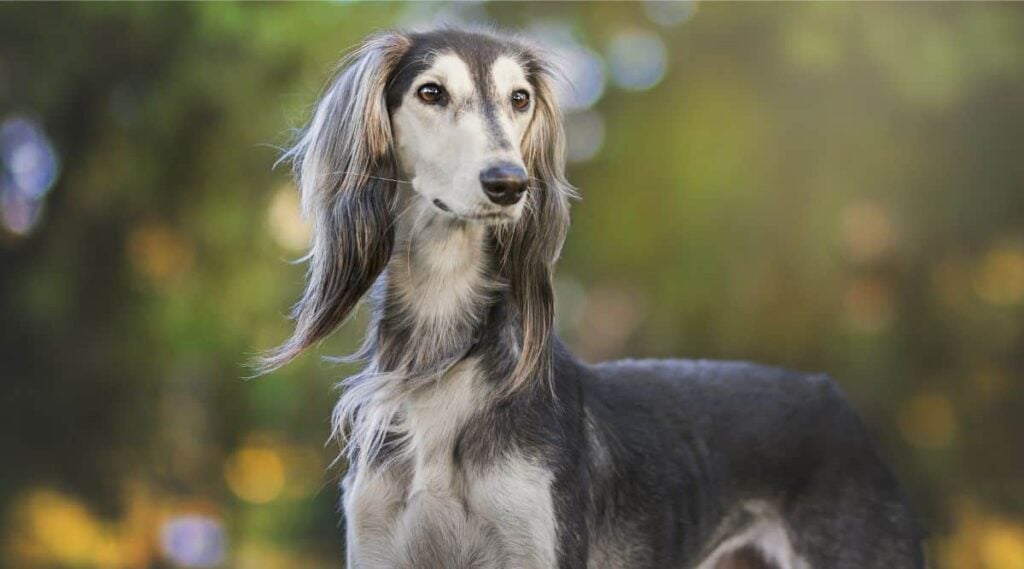
Why Choose A Quiet Dog Breed?
Not every dog needs to narrate your life like a furry sports announcer. Some are perfectly happy just hanging out in peace — and that’s a win for everyone.
Perfect For Apartment Living
In a small space, even one bark can feel like surround sound. Quiet breeds like the French Bulldog or Whippet are great apartment buddies — they bring snuggles, not noise complaints.
Better Relationships With Neighbors
Nobody wants to be “that neighbor” with the barking dog. Low-barking breeds keep the peace in hallways, elevators, and with delivery drivers who’d rather not be greeted like intruders.
Stress Relief at Home
Peaceful pups = peaceful people. Breeds like the Cavalier King Charles Spaniel or Basenji help create a calmer home environment. Fewer surprise barks mean fewer heart-jolting coffee spills.
Balanced Companionship
Quiet doesn’t mean boring. A Whippet will zoom across your living room, then curl up like a cat for hours. A Shiba Inu might give you side-eye but won’t give you a noise complaint. Personality without the noise — best of both worlds.
7 Small Dog Breeds That Don’t Bark (Much)
Despite their reputation, not every small dog is a yap machine. These pint-sized companions are calm, adaptable, and perfect for apartments or anyone who wants a dog that fits in their lap (and not in the neighbor’s complaint box).
Basenji
The Basenji is known as the “barkless dog,” though they’ll serenade you with their signature yodel if the mood strikes. Intelligent but independent, they require patience in training — think of them as the dog version of a roommate, not a servant.
Their short coats are nearly maintenance-free, and they groom themselves much like cats. Generally healthy, they may face joint or eye conditions later in life.
- Personality: Intelligent, independent, curious
- Bark-O-Meter: 1/10 – the “barkless dog” (but they yodel!)
- Size: 20–24 pounds
- Life Expectancy: 12–16 years
- Why You’ll Love Them: A dog that doesn’t bark, cleans itself, and yodels when happy — what’s not to love?
Cavalier King Charles Spaniel
The Cavalier is as sweet as they look — gentle, affectionate, and eager to please. They train easily thanks to their people-pleasing nature, though they can be sensitive, so positive methods work best.
Their silky coats require weekly brushing, and health concerns often include heart disease and ear infections. Despite those needs, they’re known for being relatively quiet and calm, alerting you only when it’s truly necessary.
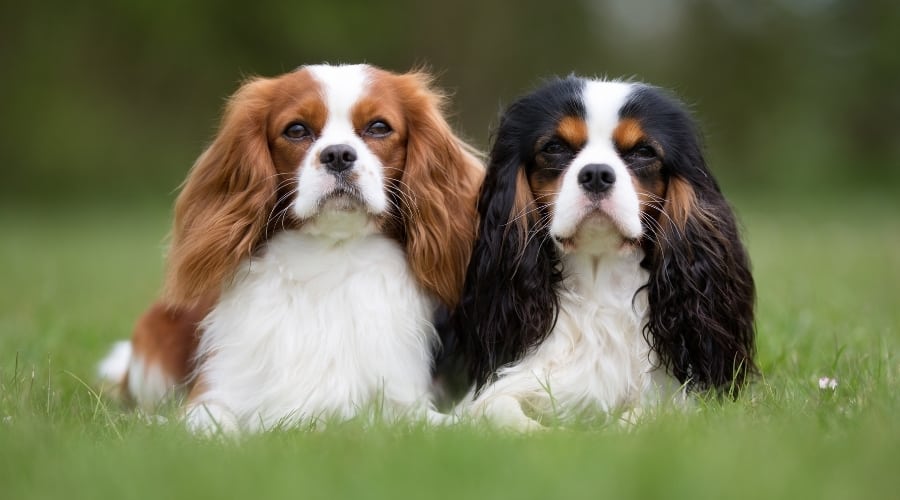
- Personality: Sweet, loyal, affectionate
- Bark-O-Meter: 3/10 – soft warnings only, not a chatterbox
- Size: 13–18 pounds
- Life Expectancy: 12–15 years
- Why You’ll Love Them: The lapdog that won’t announce every squirrel sighting.
French Bulldog
Frenchies are charming clowns, but you’ll hear more snorts, snores, and silly noises than actual barking. Training can take patience — they’re smart but stubborn — and grooming is easy thanks to their short coat.
Their biggest health concerns are breathing issues and overheating, so keep them cool and comfortable. Still, they thrive in apartments and are happiest glued to your side.
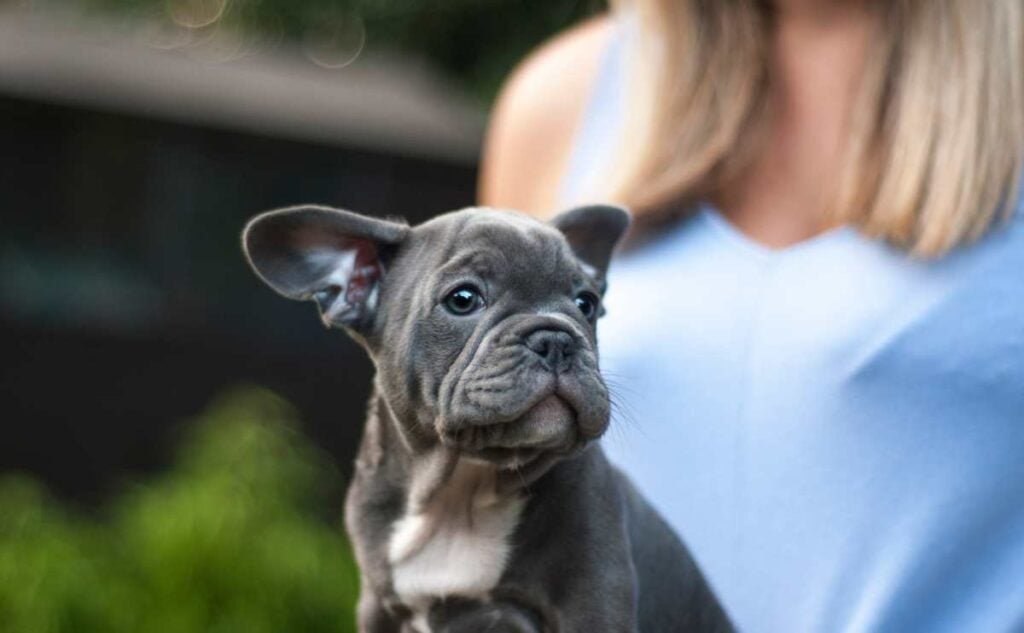
- Personality: Playful, affectionate, charming
- Bark-O-Meter: 2/10 – more grunts than barks
- Size: 16–28 pounds
- Life Expectancy: 8–13 years
- Why You’ll Love Them: A born entertainer who keeps things lively without making a racket.
Japanese Chin
The Japanese Chin is dainty, catlike, and surprisingly low-maintenance. They’re quick to bond with their people and pick up training easily, though they can be a bit stubborn about housebreaking.
Grooming their fine coat requires regular brushing, but not as much as you’d expect. They’re generally healthy, though prone to breathing sensitivities like other short-nosed breeds. And best of all? They’re famously quiet and dignified.

- Personality: Elegant, affectionate, catlike
- Bark-O-Meter: 2/10 – polite, occasional alerting
- Size: 7–11 pounds
- Life Expectancy: 10–12 years
- Why You’ll Love Them: Small, graceful, and calm — a pint-sized dog who won’t wear out your ears.
Pug
Pugs are the comedians of the dog world — playful, affectionate, and always ready to make you laugh. Despite their chatty personalities, they’re not excessive barkers, preferring snorts and snuffles over yappy outbursts.
Grooming is simple with their short coats, though they do shed more than you’d expect. Training is straightforward if you keep sessions fun and light. Health concerns mostly relate to their flat faces (breathing issues) and weight management, so portion control is key.

- Personality: Charming, affectionate, playful
- Bark-O-Meter: 3/10 – more snorts than barks
- Size: 14–18 pounds
- Life Expectancy: 12–15 years
- Why You’ll Love Them: A pint-sized clown who makes funny noises but rarely barks up a storm.
Shiba Inu
Independent and foxlike, Shiba Inus are famously clean and aloof. They don’t bark much, but when they do, it’s usually their high-pitched “Shiba scream” — reserved for dramatic moments.
Training requires persistence, as they’re stubborn, but they’re intelligent and quick learners. Grooming is moderate — their double coat sheds heavily a couple of times a year. Their health is generally good, though they may face joint or eye issues with age.
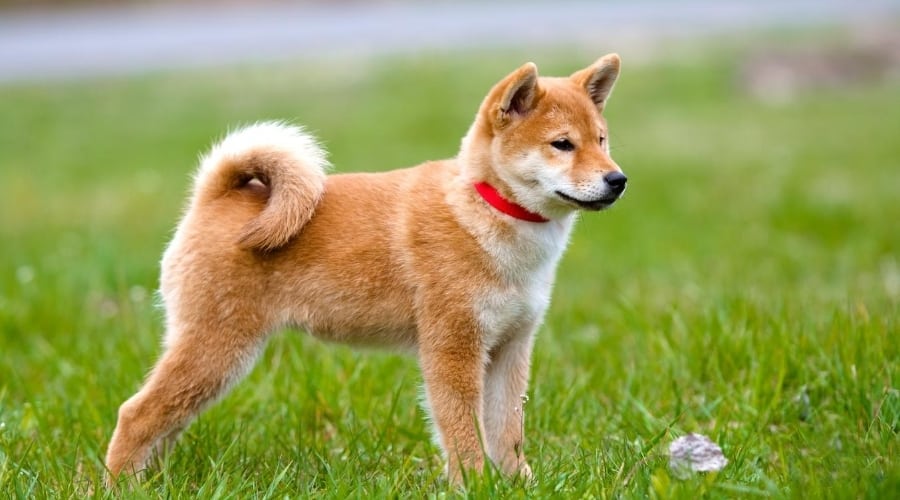
- Personality: Alert, bold, aloof, independent
- Bark-O-Meter: 3/10 – not barky, but watch for the “Shiba scream”
- Size: 17–23 pounds
- Life Expectancy: 12–16 years
- Why You’ll Love Them: A catlike dog that keeps commentary to a minimum (unless they’re feeling extra dramatic).
Shih Tzu
Bred to sit in the laps of Chinese emperors, the Shih Tzu is affectionate without being overly vocal. Training is straightforward with gentle consistency, and while they don’t bark much, they may “talk” for attention.
Their long, flowing coat requires frequent grooming — though many owners keep them trimmed short for easier upkeep. Health concerns include eye and breathing issues, but overall, they’re adaptable and people-focused.
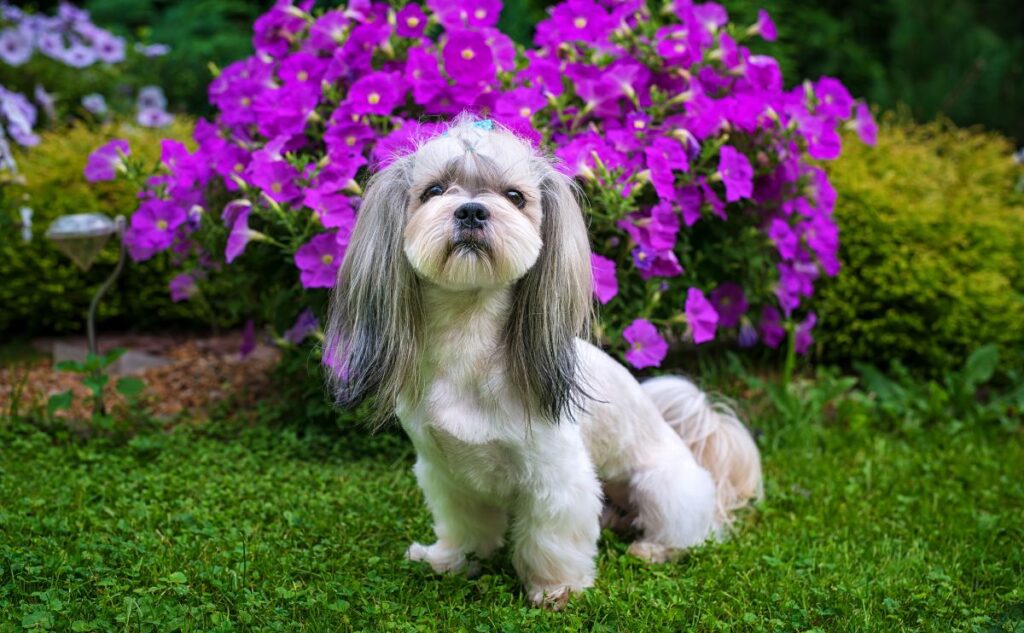
- Personality: Affectionate, friendly, adaptable
- Bark-O-Meter: 4/10 – occasional chatterbox tendencies
- Size: 9–16 pounds
- Life Expectancy: 10–16 years
- Why You’ll Love Them: Loyal companions who’d rather nap on your lap than bark at the neighbors.
8 Medium-Sized Dog Breeds That Don’t Bark A Lot
Medium dogs often strike the sweet spot: big enough for adventures, small enough to cuddle on the couch. These breeds bring balanced energy, easygoing personalities, and quiet companionship.
Chow Chow
The Chow Chow looks like a lion crossed with a teddy bear, and their personality is equally unique. Aloof and independent, they’re not overly affectionate but bond deeply with their families.
Training requires patience, as they can be stubborn, and grooming is a daily business with all that fluff. Health concerns include hip dysplasia and eye issues, but they’re surprisingly low-maintenance in noise.
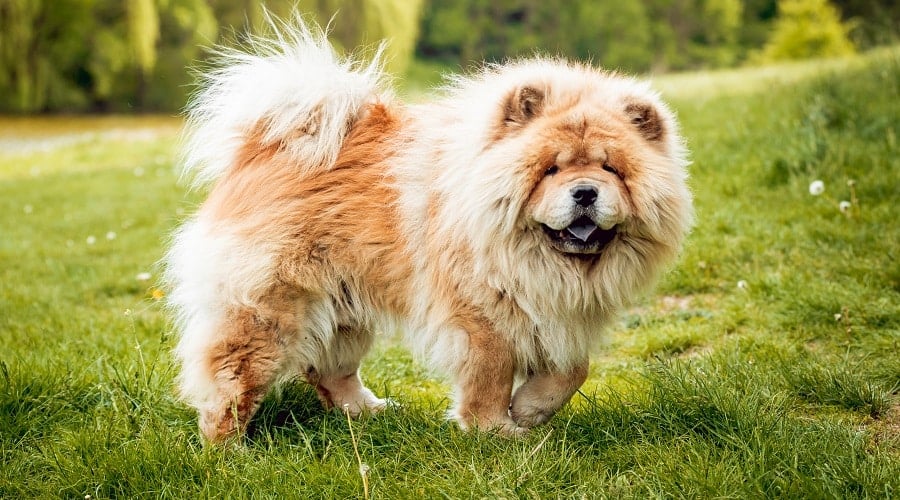
- Personality: Reserved, loyal, dignified
- Bark-O-Meter: 4/10 – aloof, but will bark when guarding
- Size: 45–70 pounds
- Life Expectancy: 8–12 years
- Why You’ll Love Them: A fluffy, dignified companion who guards your peace as fiercely as your snacks.
English Bulldog
English Bulldogs are lovable couch potatoes with a surprisingly quiet demeanor. Training takes consistency since they can be stubborn, but they’re eager to please once motivated.
Grooming is minimal, though those wrinkles need regular cleaning. Their health can be a challenge, especially with breathing and joint issues, so they do best with a laid-back lifestyle. Instead of barking, expect a symphony of snores.

- Personality: Relaxed, gentle, friendly
- Bark-O-Meter: 3/10 – more likely to wheeze than woof
- Size: 40–60 pounds
- Life Expectancy: 8–10 years
- Why You’ll Love Them: A low-energy, snoring sidekick who prefers naps to noise.
Greyhound
Despite their racing careers, Greyhounds are the definition of low-key. They train easily with kindness, rarely bark, and love lounging. Grooming is minimal, and health concerns include to canine bloat and thin skin. They need daily walks and occasional zoomies, but indoors, they’re legendary couch potatoes.
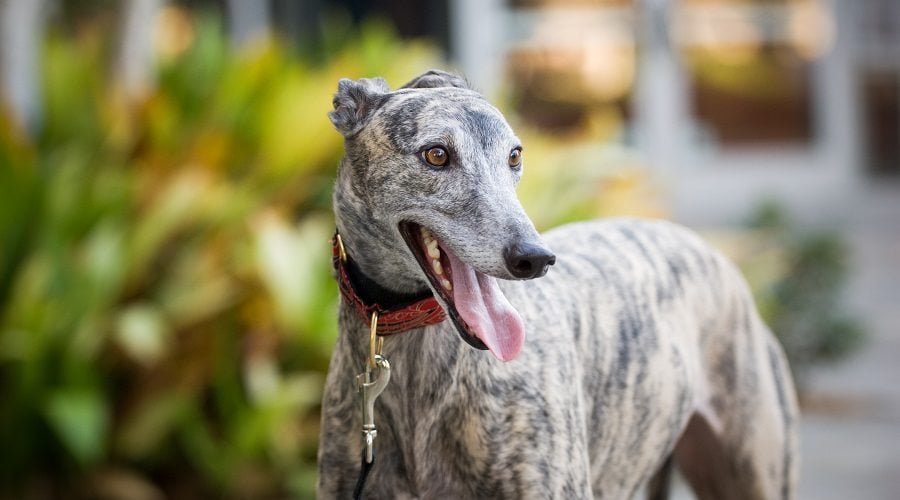
- Personality: Sweet, quiet, laid-back
- Bark-O-Meter: 2/10 – content to stay silent
- Size: 60–70 pounds
- Life Expectancy: 10–14 years
- Why You’ll Love Them: A racing dog who’d rather sleep than speak.
Irish Setter
Irish Setters are flashy red-coated athletes with cheerful temperaments. They’re playful and social, but not prone to excessive barking. Training is best started young since they can be excitable, and grooming requires regular brushing.
Health issues can include bloat and hip dysplasia, but they’re generally healthy and long-lived for their size. Indoors, they’re much quieter than their bouncy energy suggests.
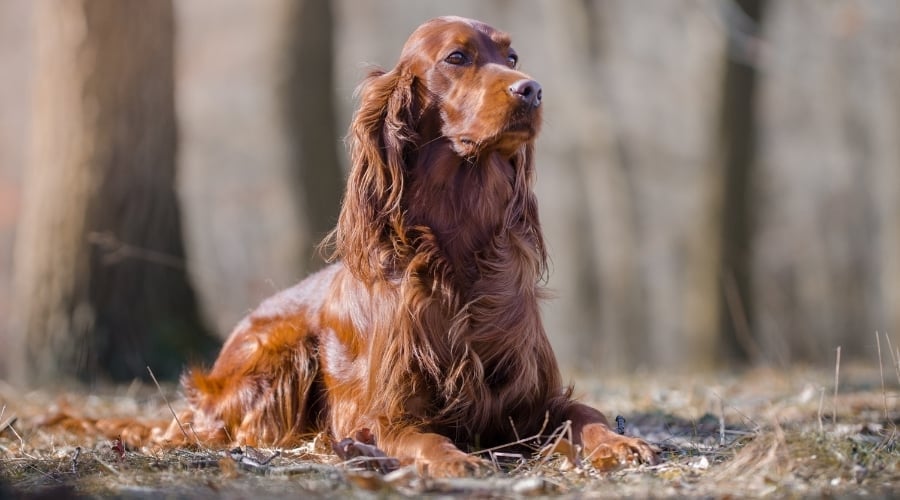
- Personality: Outgoing, sweet, energetic
- Bark-O-Meter: 4/10 – playful chatter, but not excessive
- Size: 55–70 pounds
- Life Expectancy: 12–15 years
- Why You’ll Love Them: A high-energy playmate outdoors, a surprisingly mellow roommate indoors.
Saluki
Graceful and ancient, Salukis are elegant companions with a calm nature. They’re trainable but prefer a gentle hand — harsh methods won’t work with their sensitive personalities. Grooming is simple, requiring occasional brushing for their fine coat.
They’re generally healthy, though heart conditions can sometimes appear. And while they can run like the wind outside, indoors, they’re quiet, calm roommates.
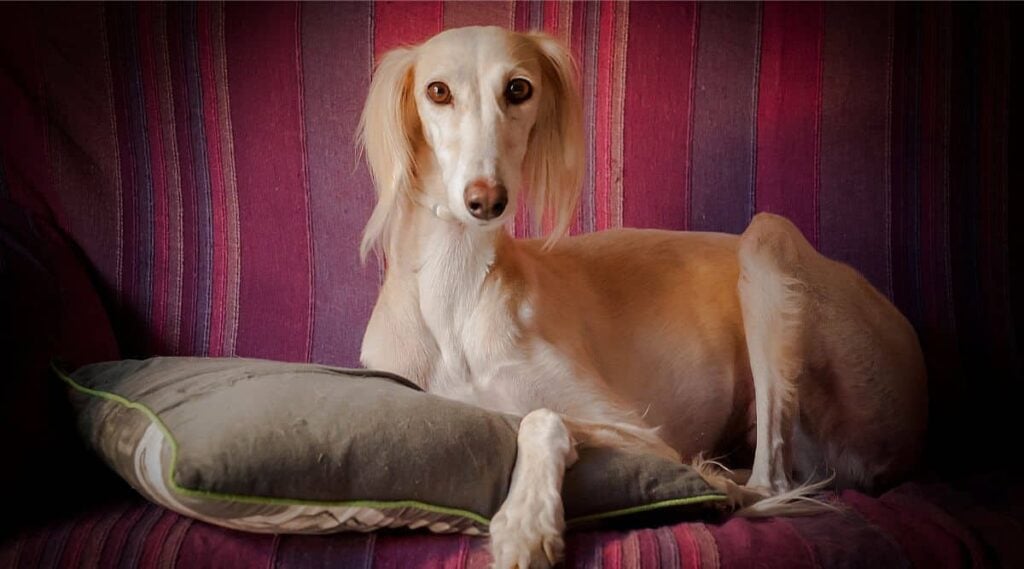
- Personality: Gentle, loyal, independent
- Bark-O-Meter: 2/10 – prefers running to barking
- Size: 40–65 pounds
- Life Expectancy: 10–17 years
- Why You’ll Love Them: A dignified, athletic dog who saves its energy (and its voice) for special occasions.
Shar-Pei
The Shar-Pei may look like a permanent wrinkle, but inside is a composed and quiet personality. They’re naturally protective, so early training and socialization are essential. Grooming is straightforward, though their folds need careful cleaning to prevent infections.
They’re prone to skin, joint, and eye issues, but otherwise are healthy companions. Unlike many guard dogs, they won’t bark unless there’s a real reason.

- Personality: Loyal, calm, dignified
- Bark-O-Meter: 3/10 – reserved, barks only when it matters
- Size: 45–60 pounds
- Life Expectancy: 14–18 years
- Why You’ll Love Them: A watchful but restrained protector wrapped in wrinkles.
Soft-Coated Wheaten Terrier
Unlike many terriers, Wheatens are more about tail wags than non-stop barking. They’re friendly, easy to train with positive reinforcement, and less stubborn than their terrier cousins.
Grooming is a must for their soft, silky coats, but they don’t shed much. Health concerns include protein sensitivities and occasional allergies, but overall, they’re sturdy, happy dogs.
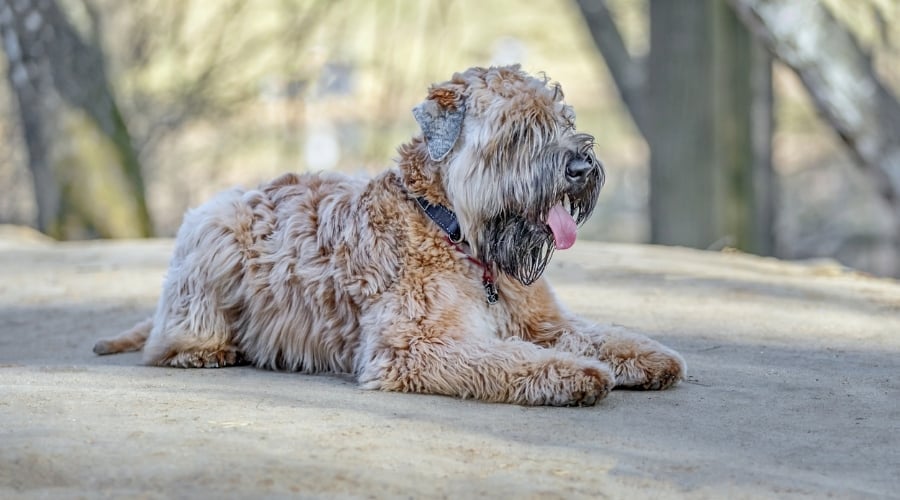
- Personality: Cheerful, affectionate, spirited
- Bark-O-Meter: 5/10 – excitable greetings, but not nonstop
- Size: 30–40 pounds
- Life Expectancy: 12–14 years
- Why You’ll Love Them: The terrier that proves not all small-to-medium dogs need to shout.
Whippet
A close cousin to the Greyhound, Whippets are famously quiet and affectionate. They train easily, need minimal grooming, and are generally healthy aside from cold sensitivity (sweaters recommended!). They’ll happily sprint outside, then nap for hours indoors. Barking? Almost never.
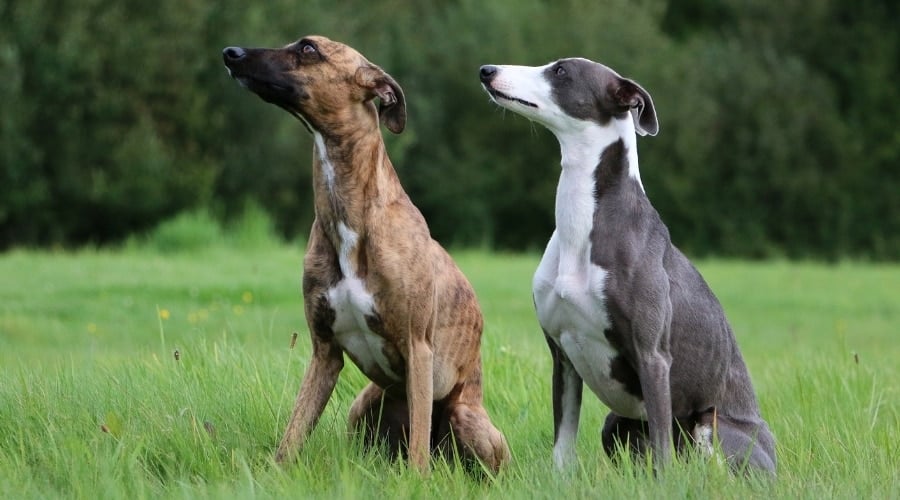
- Personality: Gentle, affectionate, athletic
- Bark-O-Meter: 2/10 – prefers naps over noise
- Size: 25–40 pounds
- Life Expectancy: 12–15 years
- Why You’ll Love Them: Built for speed, but happiest as your silent snuggle buddy.
9 Large Quiet Dog Breeds
When it comes to gentle giants, bigger doesn’t mean louder. These large breeds are often mellow, protective without being noisy, and surprisingly low-maintenance when it comes to barking. Think of them as the strong, silent types of the dog world.
Akita
Akitas are strong, loyal protectors who believe barking is beneath them unless absolutely necessary. They require early training and socialization — firm but fair methods work best.
Grooming is moderate with their thick double coats, especially during shedding season. Health issues can include hip dysplasia and thyroid problems, but with care, they’re steady, dependable companions.
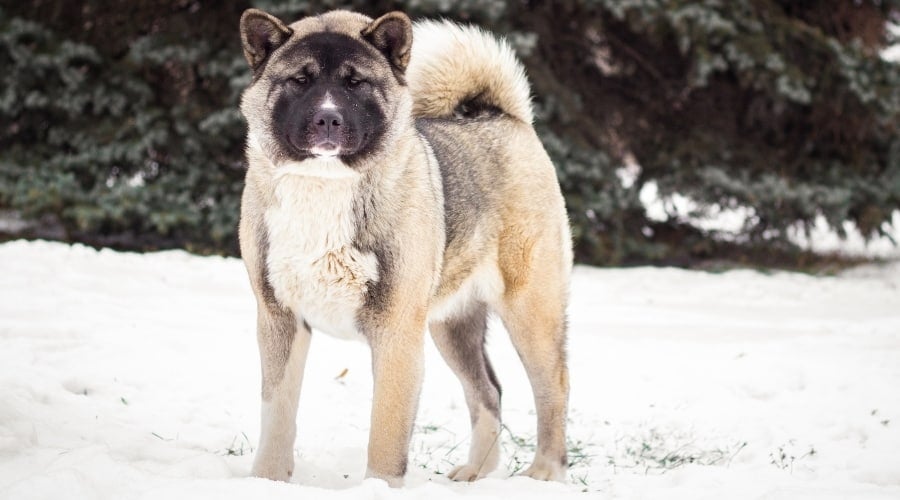
- Personality: Protective, dignified, loyal
- Bark-O-Meter: 3/10 – quiet but protective when needed
- Size: 70–130 pounds
- Life Expectancy: 10–14 years
- Why You’ll Love Them: Silent guardians who’d rather watch over you than wake the neighbors.
Bernese Mountain Dog
Bernese Mountain Dogs are gentle giants with affectionate personalities. They’re easy to train thanks to their eagerness to please, though their thick coats demand regular brushing.
Health is their biggest challenge, with short lifespans and a predisposition to cancer. But while they’re with you, they’re peaceful, loyal family members who rarely bark unnecessarily.
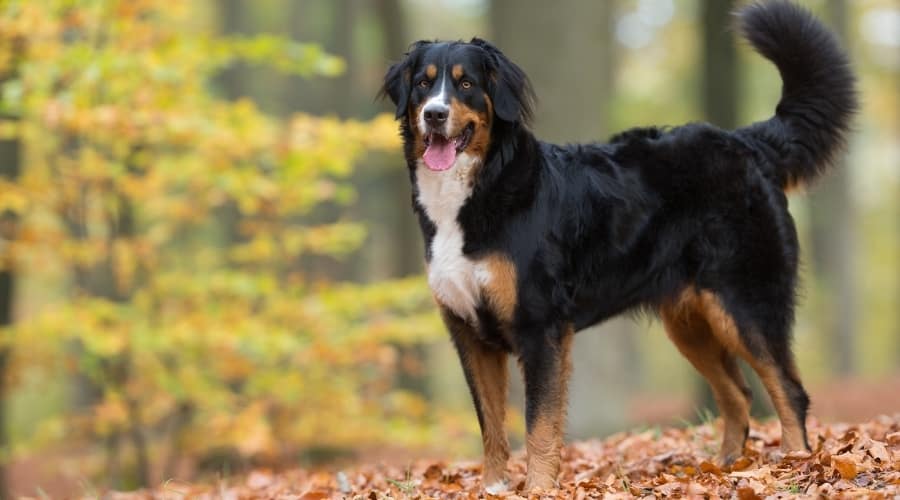
- Personality: Gentle, affectionate, hardworking
- Bark-O-Meter: 4/10 – mellow, occasional watchdog alerts
- Size: 80–115 pounds
- Life Expectancy: 7–10 years
- Why You’ll Love Them: A snuggly teddy bear of a dog who prefers cuddles over chaos.
Borzoi
The Borzoi is elegant, graceful, and reserved. They’re calm indoors and rarely bark, though they need space to sprint when the mood hits. Training requires patience since they’re independent thinkers, and grooming involves regular brushing of their long coats.
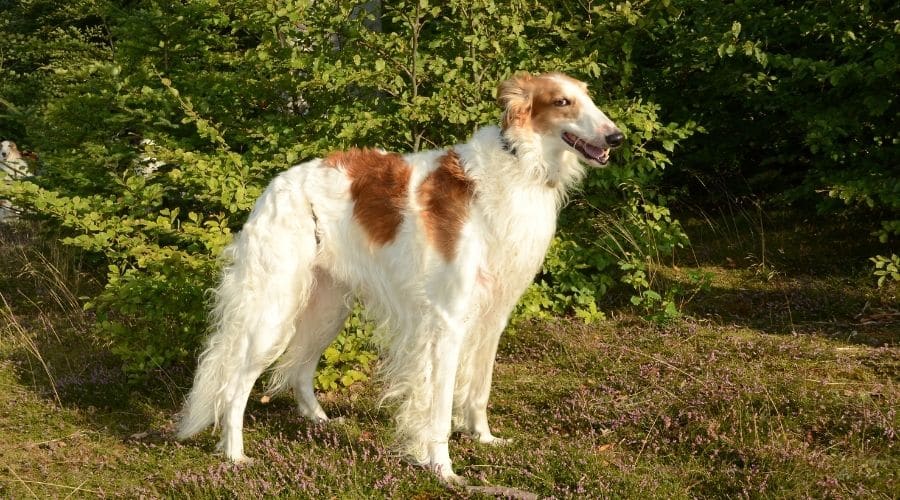
- Personality: Independent, dignified, gentle
- Bark-O-Meter: 2/10 – dignified and nearly silent
- Size: 60–105 pounds
- Life Expectancy: 10–12 years
- Why You’ll Love Them: A regal-looking hound who prefers quiet elegance over noisy drama.
Bullmastiff
Bullmastiffs are natural guardians who let their size do the talking. They’re calm, loyal, and bark only when they truly need to. Grooming is minimal, though they’re prone to drooling.
Training and socialization are essential, and health issues can include hip dysplasia and heart problems. Despite their intimidating presence, they’re affectionate with family.
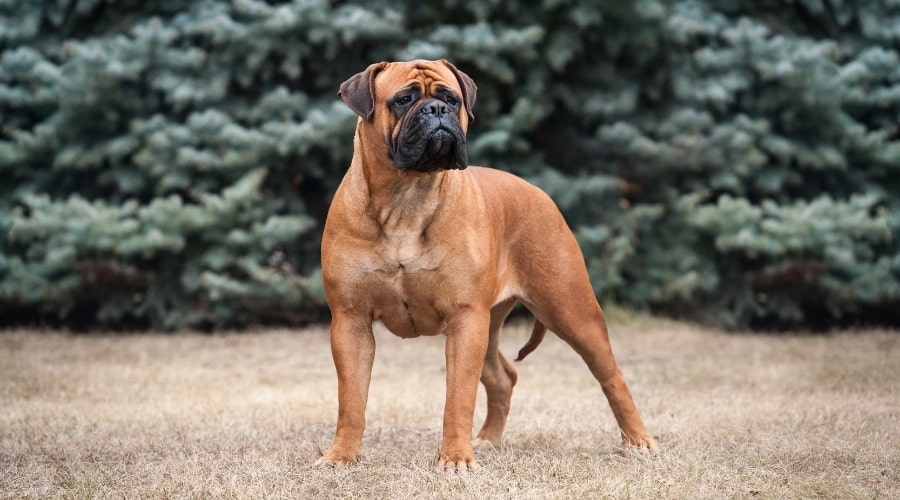
- Personality: Brave, protective, affectionate
- Bark-O-Meter: 2/10 – bred to guard silently
- Size: 100–140 pounds
- Life Expectancy: 7–10 years
- Why You’ll Love Them: A silent watchdog who doubles as a slobbery teddy bear.
Great Dane
Great Danes are “gentle giants” in every sense. Despite their imposing size, they’re mellow, affectionate, and not prone to barking. Training is straightforward with consistency, and grooming is minimal with their short coats. Health risks include bloat and joint issues, so regular vet care is key. At home, they’re as content lounging as they are protecting.
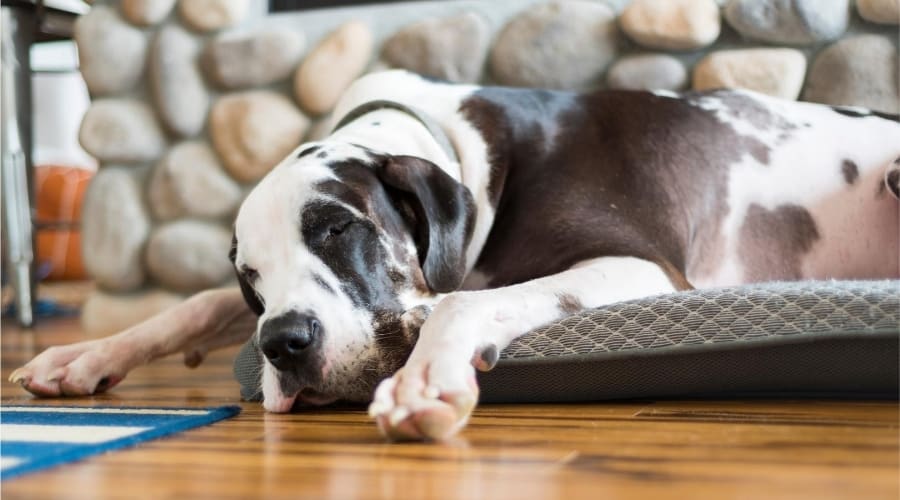
- Personality: Gentle, affectionate, dependable
- Bark-O-Meter: 3/10 – deep voice, used sparingly
- Size: 110–175 pounds
- Life Expectancy: 7–10 years
- Why You’ll Love Them: A massive cuddle buddy who takes up the couch but not the airspace.
Newfoundland
Newfoundlands, or “Newfies,” are sweet, patient giants with famously gentle temperaments. They rarely bark, preferring calm companionship. Grooming is regular thanks to their thick, water-resistant coats, and health concerns include heart disease and joint issues. Training is easy with positive reinforcement, and their love of water is legendary.
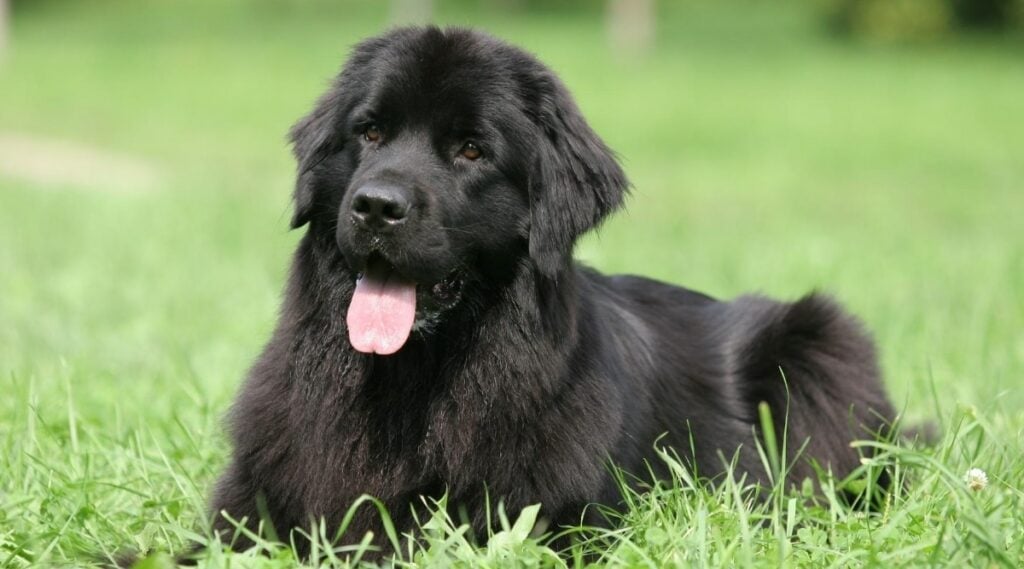
- Personality: Sweet, patient, gentle
- Bark-O-Meter: 3/10 – calm giant, occasional alerts
- Size: 100–150 pounds
- Life Expectancy: 8–10 years
- Why You’ll Love Them: The family babysitter in fur — gentle, watchful, and calm.
Rhodesian Ridgeback
Originally bred to track lions, Rhodesian Ridgebacks are courageous but controlled. They’re confident watchdogs who don’t bark excessively.
Grooming is minimal, training requires consistency, and health concerns include hip dysplasia and thyroid problems. Athletic and dignified, they’re quiet guardians who thrive with strong leadership.
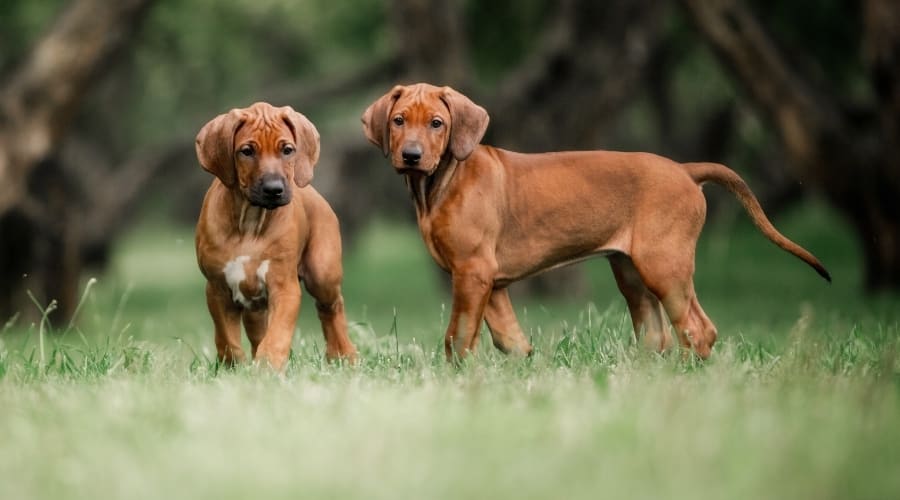
- Personality: Strong, loyal, dignified
- Bark-O-Meter: 3/10 – quiet but vigilant
- Size: 70–85 pounds
- Life Expectancy: 10–12 years
- Why You’ll Love Them: A noble protector who saves their voice for when it matters.
Saint Bernard
Saint Bernards are enormous, drooly, and famously gentle. They’re great with kids and remain calm in almost any situation. Training takes patience, grooming is regular for their thick coats, and health risks include hip dysplasia and heart conditions. Despite their booming voices, they rarely bark without good reason.
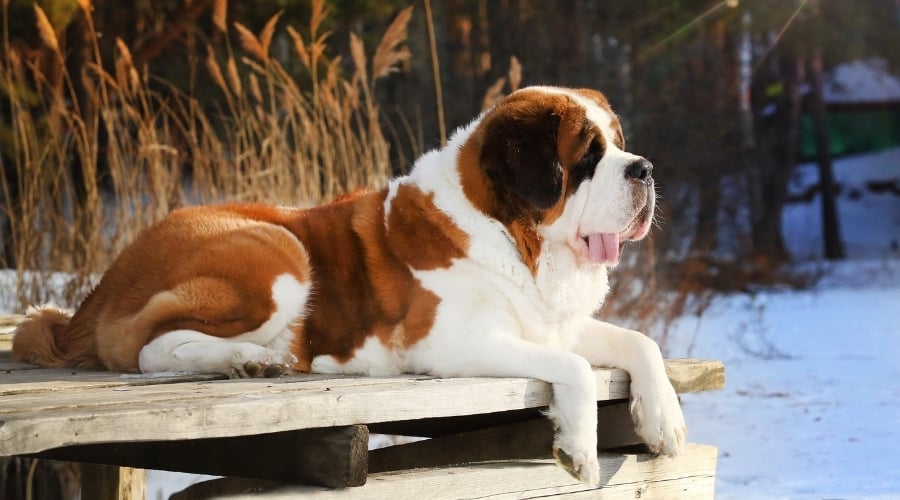
- Personality: Gentle, patient, loving
- Bark-O-Meter: 4/10 – deep, rumbling warning bark
- Size: 120–180 pounds
- Life Expectancy: 8–10 years
- Why You’ll Love Them: A giant cuddle machine who prefers naps to noise.
Scottish Deerhound
Scottish Deerhounds are noble, affectionate dogs with calm dispositions. They thrive with daily exercise but are quiet and gentle at home. Grooming is light for their wiry coats, and health concerns include shorter lifespans and occasional heart issues. Training is straightforward if started young, and their mellow nature makes them easy companions.
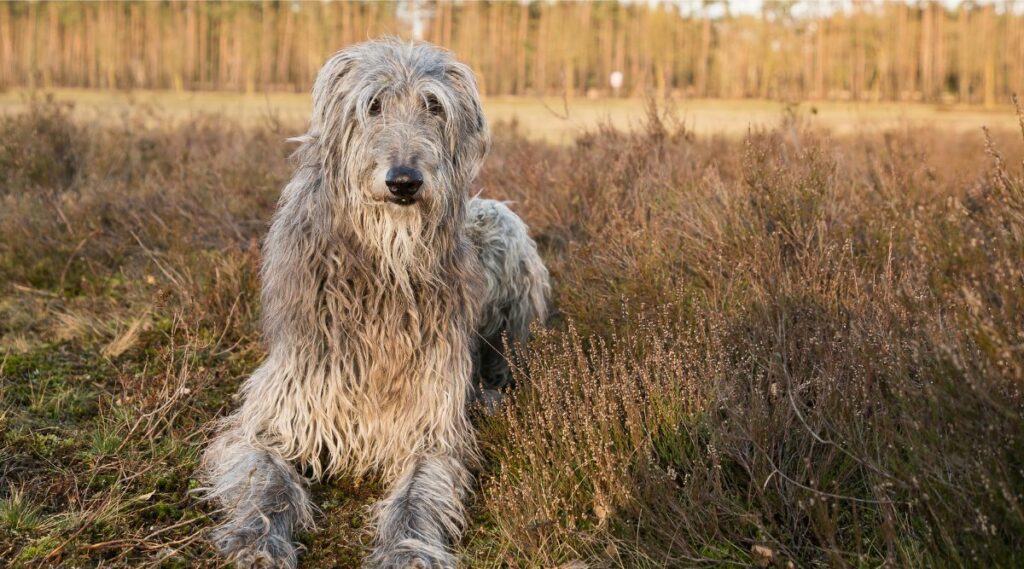
- Personality: Dignified, gentle, affectionate
- Bark-O-Meter: 2/10 – gentle giant with little to say
- Size: 75–110 pounds
- Life Expectancy: 8–11 years
- Why You’ll Love Them: A regal, quiet hound who balances elegance with warmth.
Bark-O-Meter Comparison: Quietest To Chattiest
| Breed | Bark-O-Meter Score | Notes |
|---|---|---|
| Basenji | 1/10 | The “barkless dog” — expect yodels, not woofs |
| Borzoi | 2/10 | Dignified, silent sighthound |
| Whippet | 2/10 | Couch potato with almost no bark |
| Greyhound | 2/10 | Quiet racer, gentle at home |
| Saluki | 2/10 | Prefers running to barking |
| Scottish Deerhound | 2/10 | Calm giant, little vocalization |
| Bullmastiff | 2/10 | Guarding breed that works silently |
| French Bulldog | 2/10 | Grunts, snores, but rarely barks |
| Japanese Chin | 2/10 | Polite, occasional alerts |
| Akita | 3/10 | Reserved, protective only |
| Cavalier King Charles Spaniel | 3/10 | Gentle, soft alerts only |
| Shiba Inu | 3/10 | Quiet except for the “Shiba scream” |
| Pug | 3/10 | More snorts than barks |
| Newfoundland | 3/10 | Calm giant, deep but rare bark |
| Rhodesian Ridgeback | 3/10 | Quiet watchdog |
| Great Dane | 3/10 | Big dog, deep but infrequent bark |
| Bernese Mountain Dog | 4/10 | Occasional watchdog barks |
| Irish Setter | 4/10 | Playful chatter, not constant |
| Shih Tzu | 4/10 | Will bark for attention sometimes |
| Saint Bernard | 4/10 | Deep, rumbling alerts |
| Chow Chow | 4/10 | Aloof, protective barking |
| Shar-Pei | 3/10 | Reserved, only barks when guarding |
| Soft Coated Wheaten Terrier | 5/10 | Excitable greetings, otherwise moderate |
Best For: Which Quiet Dog Breed Fits Your Life?
- Apartments & Small Spaces: French Bulldog, Cavalier King Charles Spaniel, Whippet, Greyhound
- Families with Kids: Bernese Mountain Dog, Newfoundland, Shih Tzu, Irish Setter
- First-Time Owners: Cavalier King Charles Spaniel, Wheaten Terrier, French Bulldog, Whippet
- Protection & Watchdogs: Akita, Bullmastiff, Shar-Pei, Rhodesian Ridgeback
- Unique Personalities: Pug, Basenji, Shiba Inu, Japanese Chin, Borzoi, Chow Chow
Frequently Asked Questions About Quiet Dog Breeds
Do you have more questions about quiet dog breeds? You’re not alone! We’ve rounded up some of the most common ones below. If you don’t see yours here, drop it in the comments — we’d love to hear from you and help answer.
What’s The Quietest Dog Breed?
The Basenji, hands down. They don’t bark — they yodel. This is the only breed that doesn’t bark.
Do Quiet Dogs Still Make Good Watchdogs?
Yes. Akitas, Bullmastiffs, and Ridgebacks guard with presence, not volume.
Are Small Dogs Noisier Than Large Dogs?
Usually, yes. But Cavaliers, Shih Tzus, and Japanese Chins break the stereotype.
Barking Breeds To Avoid If You Crave Peace
Some dogs are born to be quiet companions, and others are auditioning for the role of neighborhood alarm system. If silence is golden in your household, here are some famously barky breeds you may want to think twice about:
Terriers: The Loud Little Hunters
Terriers were bred to hunt vermin, and that meant alerting their humans — loudly. Jack Russells, Yorkshire Terriers, and Westies are adorable, energetic, and clever, but they’ll bark at just about anything that moves. Training can help manage it, but barking is hardwired into their DNA.
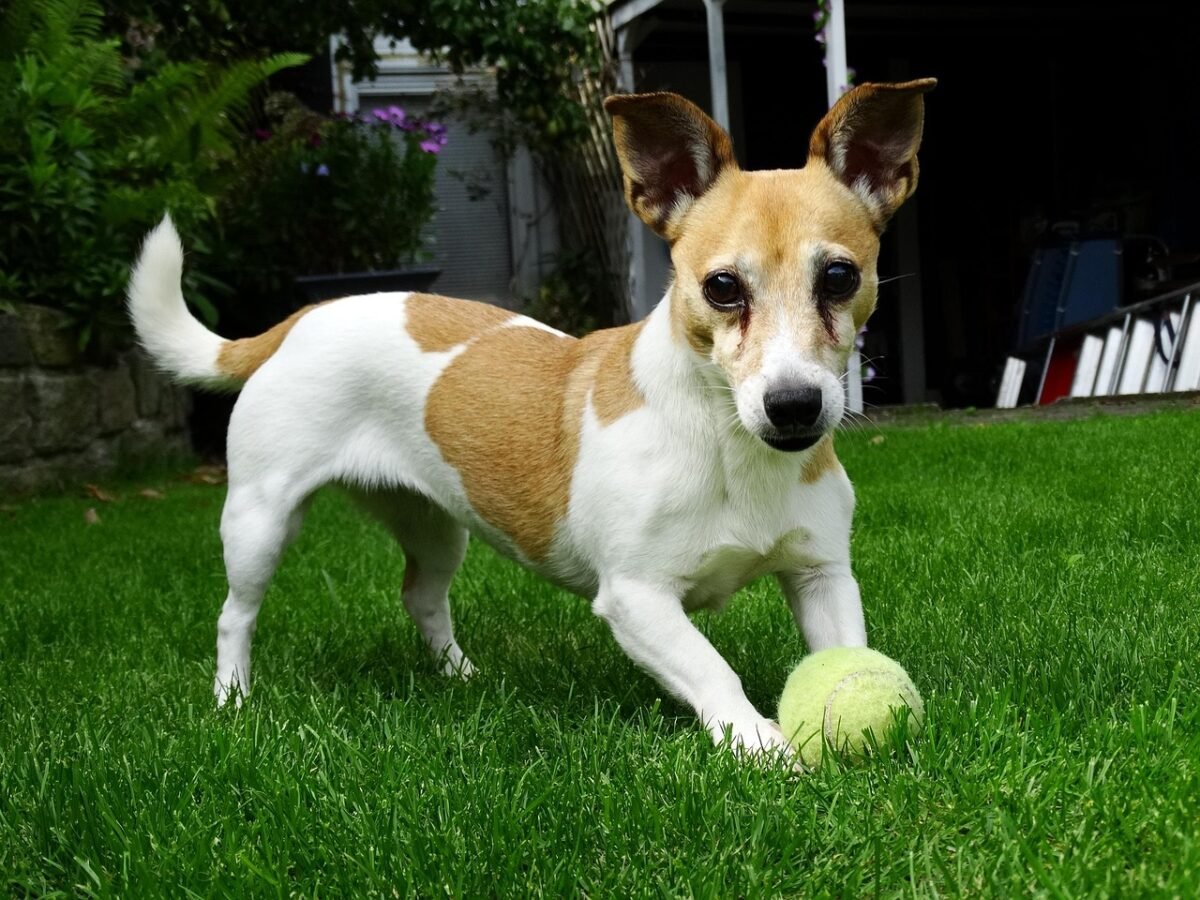
- Famous barkers: Jack Russell Terrier, Yorkshire Terrier, West Highland White Terrier
- Why so vocal? Natural watchdogs with a sharp prey drive
- Best for: Owners who enjoy a spunky, talkative dog
Arctic Talkers: The Howlers and Comedians
Siberian Huskies and Alaskan Malamutes are legendary for their “voices.” Instead of barking, they prefer howls, yips, and dramatic “talking.” They’ll argue with you about dinner, sing along with sirens, and let the neighborhood know their feelings. Beautiful dogs, but quiet they are not.
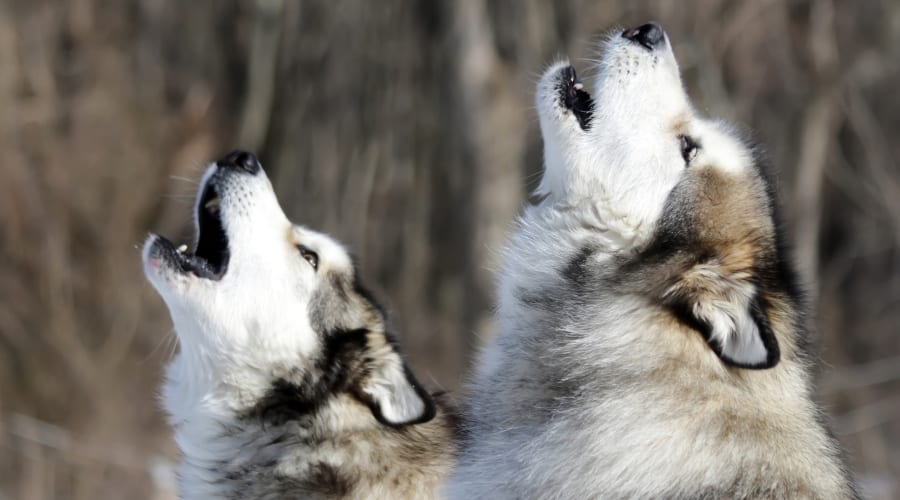
- Famous barkers: Siberian Husky, Alaskan Malamute, Samoyed
- Why so vocal? Pack dogs bred to communicate across icy distances
- Best for: Owners who don’t mind a daily concert (and maybe a few complaints from neighbors)
Little Breeds: Big Voices In Small Bodies
Don’t let their size fool you. Breeds like Chihuahuas and Miniature Schnauzers often act like they run the world — and they’ll announce every stranger, squirrel, and suspicious sound. Training and socialization can help, but these little dogs often have big opinions.

- Famous barkers: Chihuahua, Dachshund, Miniature Schnauzer, Pomeranian, Miniature Pinscher
- Why so vocal? Alert personalities, protective instincts
- Best for: Owners who enjoy sass and don’t mind some noise
Guard Dogs: Fierce And Vocal Protectors
Some breeds were bred to guard homes and property, which often means they sound the alarm at every perceived threat. German Shepherds and Rottweilers are brilliant, loyal protectors — but also more likely to bark frequently, especially without structured training.
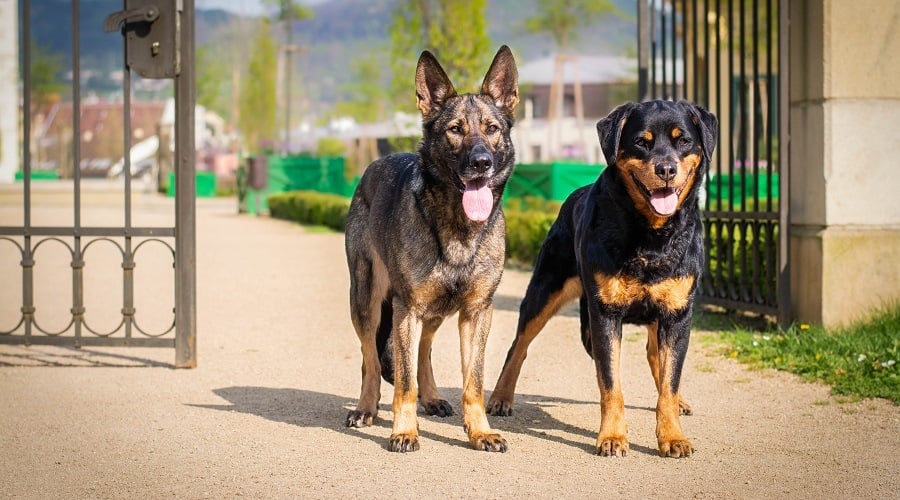
- Famous barkers: German Shepherd, Doberman Pinscher, Rottweiler, Great Pyrenees
- Why so vocal? Strong guarding instincts, hyper-alert nature
- Best for: Experienced owners who want a watchdog, not a wallflower
Vocal Hounds: The Singers of the Dog World
Hounds were bred to track game, and part of their job was to “bay” or howl to alert hunters. That instinct hasn’t gone anywhere. Beagles, Bloodhounds, and Basset Hounds are lovable, but they’ll happily sing the song of their people when they catch a scent.

- Famous barkers: Beagle, Bloodhound, Basset Hound
- Why so vocal? Baying and howling are built-in hunting tools
- Best for: Owners who love dogs with character (and don’t live in apartments)
Herding Yappers: The Overachievers
These breeds are brilliant herders, but their brains and energy come with a voice, for sure. Barking is their way of keeping sheep (and sometimes you) in line. They’ll alert at strangers, cars, squirrels, and yes — even falling leaves.
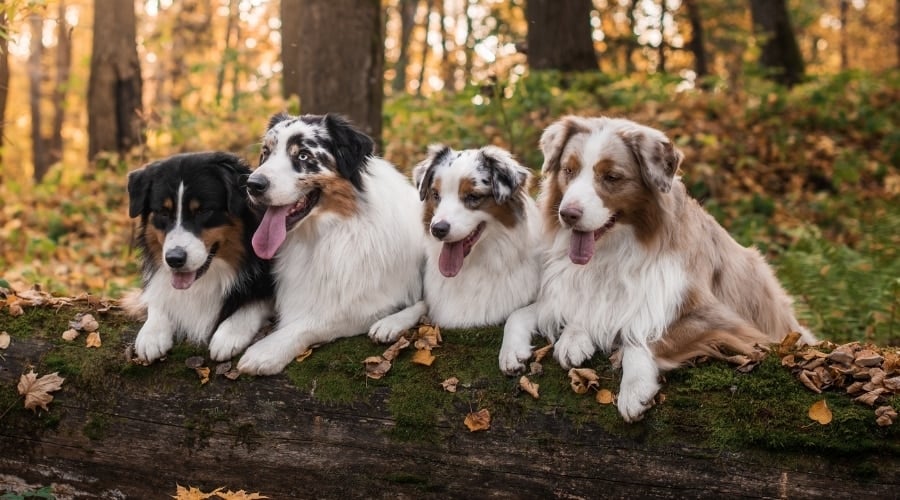
- Famous barkers: Australian Shepherd, Corgi, Shetland Sheepdog, Border Collie
- Why so vocal? Herding breeds bark to control movement and protect their flocks
- Best for: Active owners who love training, stimulation, and don’t mind chatter
None of these breeds are “bad” dogs — in fact, they’re wonderful in the right homes. But if you’re seeking dog breeds that don’t bark a lot, these are probably not your top picks. They’re better suited for owners who don’t mind a little (or a lot of) noise, or who need that extra vocal watchdog presence.
Can I Train My Dog To Bark Less?
While some breeds are naturally quieter, training can make a big difference for any dog. If your pup barks excessively, see our guide on possible reasons and step-by-step training methods to reduce the barking. Also, learn about bark collars and how to use them in our detailed guide.
In your experience, which breeds have you found the quietest and loudest? Let us know in our comments!
